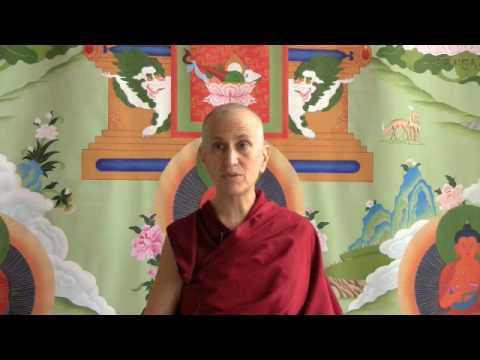Obstructions to the clear and knowing mind
Stages of the Path #111: The Third Noble Truth
Part of a series of Bodhisattva's Breakfast Corner talks on the Stages of the Path (or lamrim) as described in the Guru Puja text by Panchen Lama I Lobsang Chokyi Gyaltsen.
- The possibility of attaining liberation
- The different kinds of things that obstruct us from knowing
- How and why the obscurations can be removed
We’ve talked about the first two noble truths—the truth of the unsatisfactoriness of our existence and the truth of its source, or its origin in afflictions and karma. I talked a lot about afflictions. I didn’t talk about karma so much because we’ve already talked about that, but karma is definitely included in here.
When we move onto the third of the four noble truths, that is true cessations, which is the eradication of the defilements and their seeds in such a way that they can never return again. This brings up the whole question of, “Is it possible to attain liberation? Is it possible to cease the afflictions?” Because if it is possible then what we’re doing has meaning and purpose. And if it’s not possible then we might as well go lie on the beach. Fortunately the Buddha said it is possible, and the great sages have explained why.
It starts out with just seeing that the basic nature of the mind is clear and knowing. Clear, it’s able to reflect objects, it’s formless. Knowing, it can engage with objects, it can be aware of objects. Then we have to ask, “Well, why isn’t our mind, why doesn’t it know everything?” if it has that nature.
There are different kinds of things that can obstruct us from knowing. One is that wall obstructs me from knowing what’s on the other side of it. So there are physical obstructions that come between our sense organs and the object we want to see. Then there’s the obstruction of the distance: I can’t see Australia, Australia’s pretty far away. Or the forest where we were working yesterday is far away. My eye consciousness can’t contact that. That’s another kind of hindrance.
Another one would be a defect in the sense power. If the retina doesn’t work well, if the ear organ (what is it, the anvil, hammer) if those are defective, then that can impede also with knowing things.
Similarly, the kind of brain a sentient being has can impede its knowing. By the kind of brain that the turkeys have, then just, although their mind is the mind of a sentient being, it has buddha nature, because that mind is in a turkey body and affiliated with that kind of brain, it has some limitations to it.
Yet another kind of limitation is the limitation of the obscurations that are on the mind due to our ignorance, and due to our negative karma. The other obscurations we’ve talked about are more physical or with the sense organs. This has to do with the actual perceiving consciousness. When our minds are covered, or masked by ignorance, by the other afflictions, by the seeds of those afflictions, by their imprints, by karma, then the mind, although it has the possibility, the ability, to perceive, is limited. It’s like a mirror that has dirt on it. The mirror has the possibility to reflect objects, when it’s dirty it can’t. So our mind can understand some things, but there’s a lot that’s limited because of these kinds of obscurations.
Then the question comes, “Can these obscurations be eliminated so that we can perceive all the different things?” Physical things can be eliminated. The different organs can very often be repaired. The mind doesn’t always need to depend on the kind of brain that we have now, or according to the body that a sentient being has now. And, more importantly, then the afflictions and the seeds and these kinds of things can be eliminated so that the mind has the ability to reflect the objects.
There are different reasons to support this. One is that the nature of the mind is pure. A second is that the afflictions that the afflictions themselves are adventitious, meaning that they’re temporary.
This is a whole description, so you have to come back tomorrow to hear it. Otherwise we won’t eat lunch today. But just think a little bit about the nature of the mind as having the ability to reflect and to know, and that it’s impediments that prevent that. It’s not from some inherent quality on the side of the consciousness.
Venerable Thubten Chodron
Venerable Chodron emphasizes the practical application of Buddha’s teachings in our daily lives and is especially skilled at explaining them in ways easily understood and practiced by Westerners. She is well known for her warm, humorous, and lucid teachings. She was ordained as a Buddhist nun in 1977 by Kyabje Ling Rinpoche in Dharamsala, India, and in 1986 she received bhikshuni (full) ordination in Taiwan. Read her full bio.


